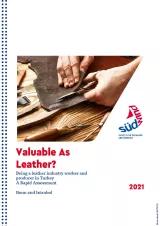Valuable as leather
This Rapid Assessment focuses on the workers and small scale producers of the leather and leather products sector in Turkey. The main objective was to describe the working environment for informal workers in the sector, to understand and differentiate problems related to those working environments and labour conditions for different worker groups with respect to age, sex, biographies, legal status, and to identify possible action towards improvement. The assessment was conducted during summer 2021 with desk research, observations and 35 semi-structured interviews with key informants (workers, employers, parents of child workers and institutions) in five provinces. Interviews display indecent working conditions, heavy workload, absence of labour standards as well as chronic uncertainty, irregular work and insecure livelihood. Some of the findings are:
- The interviewed workers earn very little. Monthly total earnings of the adult workers interviewed are roughly 2.300 TRY on average. Child workers earn much less: Monthly earnings vary between 400 TRY and 1.600 TRY.
- Parents underlined that their children shall not work, but rather continue their education. However, as they are having financial hardship and difficulties in finding livelihood sources, their children must work.
- All the workers except for one do not have working contracts. For some of the migrant workers, informality is the only option they seem to have to make a living under the given regulatory circumstances. Workers are not just unprotected regarding social security, but also considerably unprotected on the job with respect to occupational health and safety health measures.
- Female workers highlighted that apart from these problems, this male-dominated, unhygienic working environment in the sector is not suitable for them.
- In shoe, bag and belt manufacturing, working more than 10 hours per day with just one (lunch) break, and during public/national holidays is usual practice. Most workers do not consider receiving compensation either financially or with paid time off for overtime work.
- Most of the small scale producers interviewed have little room to manoeuvre to improve the situation for workers due to the economic pressures they perceive. They often work side-by-side with their employees.
- Both the integration of Syrians to the Turkish labour market and the Covid-19 pandemic had undeniable impact on the sector and its workforce which is discussed in the report.
This rapid assessment is the first step taken to disclose that the reality which the workers and small scale producers in the leather and leather products industry in Turkey experience every day is not in line with decent work and labour standards. The findings clearly indicate the necessity of further inquiries and engagement. The problematic areas and the most urgent needs expressed by the study participants were used to determine the following action areas that are expected to be considered by institutions and organizations that have a role and responsibility to contribute to the solution:
- Prioritising the unprotected and their recovery,
- Collaborative action for sustainable change,
- Tailored interventions for women and children.
